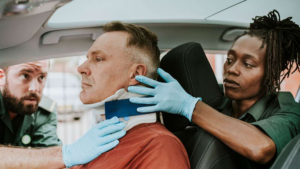Motor vehicle accidents can have devastating consequences, leading to serious injuries that often result in complicated legal proceedings. Understanding the laws surrounding these incidents in Georgia is critical for those affected. This article will explore Georgia’s motor vehicle laws, the processes following an accident, compensation options, the effects of comparative fault, and issues related to insurance after serious injuries. Additionally, certain actions such as reckless driving or causing an accident in violation of traffic laws can lead to felony charges or even a felony offense, increasing the legal consequences for those involved.

Understanding Georgia’s Motor Vehicle Laws
In Georgia, motor vehicle laws are designed to promote public safety and establish clear guidelines for behavior on the roads. These laws encompass driving regulations, responsibilities for safety, and specific protocols following accidents. The state emphasizes the importance of adhering to traffic signals, speed limits, and the use of seat belts, all of which contribute to reducing the number of accidents and fatalities on the road.
Furthermore, Georgia has implemented strict penalties for reckless driving, a charge that applies when a driver operates a vehicle with a willful disregard for safety. This offense can lead to fines, license suspension, and in severe cases, felony charges if it results in significant injury or death. Additionally, Georgia enforces strict penalties for driving under the influence (DUI), highlighting the state’s strong stance against impaired driving.
The Role of Negligence in Motor Vehicle Accidents
Negligence is a crucial concept in Georgia motor vehicle laws. It refers to the failure of a driver to exercise reasonable care, leading to an accident. To establish negligence, the following elements must typically be proven:
- Duty of Care: The driver had a legal obligation to drive safely.
- Breach of Duty: The driver did not act in accordance with the duty of care.
- Causation: The breach directly caused the accident.
- Damages: The injured party sustained actual damages as a result.
Proving these elements can be pivotal in securing compensation for injuries sustained in vehicle accidents. In many cases, eyewitness testimony, traffic camera footage, and expert analysis of the accident scene can serve as critical evidence in establishing negligence.
The Concept of Serious Injury in Georgia Law
Georgia law defines serious injury as an injury that results in significant impairment of bodily function, serious disfigurement, or the loss of a limb or organ. To qualify for certain legal remedies, an injured party must demonstrate that their injuries meet this standard.
Serious injuries may include but are not limited to:
- Traumatic brain injuries
- Spinal cord injuries
- Severe fractures
- Burn injuries
These injuries often necessitate long-term treatment and recovery, influencing the legal options available to the injured party. The financial implications of serious injuries can be staggering, encompassing not only immediate medical expenses but also ongoing rehabilitation costs, lost wages, and emotional distress. In cases where the fault driver was engaging in reckless driving or caused an accident in violation of traffic laws, additional felony charges may be imposed.

The Legal Process Following a Serious Injury
After a serious injury has occurred, the legal process begins. Understanding what to expect at each stage can empower victims as they navigate their cases.
Reporting an Accident and Initial Investigation
The first step following an accident is reporting it to the authorities. This provides an official record that can be invaluable in legal proceedings. When law enforcement arrives on the scene, they will collect evidence, interview witnesses, and create a crash report.
It is essential for injured parties to gather their own evidence as well. Documenting the scene with photographs, taking notes about the accident, and obtaining contact information from witnesses can all serve as crucial pieces of evidence later on. Additionally, victims should keep a detailed account of their injuries and any medical treatment received, as this information will be vital in establishing the extent of damages in a potential claim.
Filing a Personal Injury Claim
Once the initial investigation is complete, victims may choose to file a personal injury claim against the responsible party. This process typically involves the following steps:
- Consultation with a Personal Injury Lawyer: A knowledgeable personal injury lawyer can guide victims through the complexities of the law.
- Gathering Evidence: This may include medical records, witness statements, and accident reports.
- Filing the Claim: The lawyer will submit the necessary documentation to initiate the legal process.

Compensation for Serious Injuries in Georgia
Victims of motor vehicle accidents in Georgia may be eligible for compensation to cover their losses. Understanding the types of damages and how claims are valued is essential for pursuing fair compensation.
Types of Damages Available
In Georgia, personal injury claims typically include two main types of damages:
- Economic Damages: These cover measurable financial losses, such as medical bills, lost wages, and rehabilitation costs.
- Non-Economic Damages: These cover emotional and personal losses, such as pain and suffering, emotional distress, and loss of enjoyment of life.
The amount of compensation varies depending on the injury’s severity. For instance, someone with a long-term disability may receive more economic damages due to ongoing medical needs. Non-economic damages can also differ based on factors like the victim’s age, lifestyle, and how the injury affects their personal relationships.
The Impact of Georgia’s Comparative Fault Rule
Georgia employs a modified comparative fault rule, which can significantly affect how compensation is calculated in motor vehicle accident cases. If a victim is partially at fault for the accident, their compensation may be reduced by their percentage of fault. This rule applies even in cases where reckless driving or an accident in violation of traffic laws occurs.
Navigating Insurance Issues After a Serious Injury
One of the first steps after an accident is notifying the insurance company. However, it is important to be cautious. Insurance representatives often seek to minimize payouts and may employ tactics to gather information that undermines a claim.
Claimants should adhere to the following tips when dealing with insurance companies:
- Provide only factual information without speculation about fault.
- Keep records of all communications with the insurance company.
- Consider consulting with an attorney before accepting any settlements.
Conclusion
Navigating Georgia’s motor vehicle laws after a serious accident can be challenging. By understanding the legal framework, gathering comprehensive evidence, and working with skilled personal injury lawyers like those at Howe Law, victims can secure fair compensation and protect their rights.
If you or a loved one has been injured due to reckless driving, an accident in violation of traffic laws, or a case involving potential felony charges, don’t wait—seek legal counsel immediately. Reach out to us today!
Motor vehicle accidents can have devastating consequences, leading to serious injuries that often result in complicated legal proceedings. Understanding the laws surrounding these incidents in Georgia is critical for those affected. This article will explore Georgia’s motor vehicle laws, the processes following an accident, compensation options, the effects of comparative fault, and issues related to insurance after serious injuries.

Understanding Georgia’s Motor Vehicle Laws
In Georgia, motor vehicle laws are designed to promote public safety and establish clear guidelines for behavior on the roads. These laws encompass driving regulations, responsibilities for safety, and specific protocols following accidents. The state emphasizes the importance of adhering to traffic signals, speed limits, and the use of seat belts, all of which contribute to reducing the number of accidents and fatalities on the road.
Furthermore, Georgia has implemented strict penalties for driving under the influence (DUI), which underscores the seriousness with which the state approaches impaired driving.
The Role of Negligence in Motor Vehicle Accidents
Negligence is a crucial concept in Georgia motor vehicle laws. It refers to the failure of a driver to exercise reasonable care, leading to an accident. To establish negligence, the following elements must typically be proven:
- Duty of Care: The driver had a legal obligation to drive safely.
- Breach of Duty: The driver did not act in accordance with the duty of care.
- Causation: The breach directly caused the accident.
- Damages: The injured party sustained actual damages as a result.
Proving these elements can be pivotal in securing compensation for injuries sustained in vehicle accidents. In many cases, eyewitness testimony, traffic camera footage, and expert analysis of the accident scene can serve as critical evidence in establishing negligence. The Concept of Serious Injury in Georgia Law
Georgia law defines serious injury as an injury that results in significant impairment of bodily function, serious disfigurement, or the loss of a limb or organ. To qualify for certain legal remedies, an injured party must demonstrate that their injuries meet this standard.
Serious injuries may include but are not limited to:
- Traumatic brain injuries
- Spinal cord injuries
- Severe fractures
- Burn injuries
These injuries often necessitate long-term treatment and recovery, influencing the legal options available to the injured party. The financial implications of serious injuries can be staggering, encompassing not only immediate medical expenses but also ongoing rehabilitation costs, lost wages, and emotional distress.
In many cases, victims may require specialized care or modifications to their living environments to accommodate their new physical limitations. This reality often leads to complex legal battles, as insurance companies may contest the severity of injuries or the necessity of certain treatments, making it essential for victims to have knowledgeable legal representation to navigate these challenges effectively.

The Legal Process Following a Serious Injury
After a serious injury has occurred, the legal process begins. Understanding what to expect at each stage can empower victims as they navigate their cases.
Reporting an Accident and Initial Investigation
The first step following an accident is reporting it to the authorities. This provides an official record that can be invaluable in legal proceedings. When law enforcement arrives on the scene, they will collect evidence, interview witnesses, and create a police report.
It is essential for injured parties to gather their own evidence as well. Documenting the scene with photographs, taking notes about the accident, and obtaining contact information from witnesses can all serve as crucial pieces of evidence later on. Additionally, victims should keep a detailed account of their injuries and any medical treatment received, as this information will be vital in establishing the extent of damages in a potential claim.
Filing a Personal Injury Claim
Once the initial investigation is complete, victims may choose to file a personal injury claim against the responsible party. This process typically involves the following steps:
- Consultation with an Attorney: A knowledgeable attorney can guide victims through the complexities of the law.
- Gathering Evidence: This may include medical records, witness statements, and accident reports.
- Filing the Claim: The attorney will submit the necessary documentation to initiate the legal process.
The legal process begins with reporting the accident to the authorities. Gathering evidence—such as photos, medical records, and witness accounts—is critical. Victims should also consult experienced personal injury attorneys, like those at Howe Law, to ensure their rights are protected.

Compensation for Serious Injuries in GeorgiaVictims of motor vehicle accidents in Georgia may be eligible for compensation to cover their losses. Understanding the types of damages and how claims are valued is essential for pursuing fair compensation.
Types of Damages Available
In Georgia, personal injury claims typically include two main types of damages:
- Economic Damages: These cover measurable financial losses, such as medical bills, lost wages, and rehabilitation costs.
- Non-Economic Damages: These cover emotional and personal losses, such as pain and suffering, emotional distress, and loss of enjoyment of life.
The amount of compensation varies depending on the injury’s severity. For instance, someone with a long-term disability may receive more economic damages due to ongoing medical needs. Non-economic damages can also differ based on factors like the victim’s age, lifestyle, and how the injury affects their personal relationships.
Determining the Value of a Claim
Several factors influence the value of a personal injury claim in Georgia, including:
- Severity of the Injuries: More serious injuries generally result in higher compensation.
- Impact on Daily Life: Compensation may cover lost income and diminished ability to work.
- Future Medical Needs: Ongoing treatment or rehabilitation increases the claim’s value.
- Comparative Fault: Georgia follows a comparative fault rule, which may reduce compensation if the victim is partially at fault.
Hiring an experienced attorney can help victims navigate the claims process. Attorneys gather essential evidence—such as medical records, expert testimonies, and accident details—to maximize the claim’s value. They also negotiate with insurance companies to ensure fair compensation.
Understanding Georgia’s Statute of Limitations
In Georgia, victims have two years from the accident date to file a personal injury claim. Missing this deadline could result in losing the right to compensation. However, some exceptions may apply, so seeking legal advice promptly is crucial to preserve your rights and explore all compensation options.
The Impact of Georgia’s Comparative Fault Rule
Georgia employs a modified comparative fault rule, which can significantly affect how compensation is calculated in motor vehicle accident cases. Understanding this rule is crucial for injured parties.
How Comparative Fault Affects Compensation
If a victim is partially at fault for the accident, their compensation may be reduced by their percentage of fault. For example, if a claimant is found to be 30% responsible for their injuries, their total recovery will be diminished by that percentage.
This rule encourages responsible driving, as it holds all parties accountable for their role in an accident. However, it can complicate claims and necessitate thorough documentation and legal argumentation. In Georgia, the threshold for recovery is set at 50% fault; if a claimant is found to be more than 50% at fault, they are barred from recovering any damages. This creates a critical need for claimants to effectively present their case, as even a small percentage of fault can significantly impact the outcome of their compensation.
Defending Against Comparative Fault Claims
Effective strategies to combat claims include:
- Gathering evidence that supports the claimant’s responsible behavior.
- Using expert witnesses to provide insights into driving conditions and actions taken during the accident.
- Demonstrating the other party’s negligence through documented behaviors.
By counteracting claims of shared fault, injured parties can better secure the compensation they deserve. Furthermore, it is essential for claimants to maintain detailed records of the accident scene, including photographs, witness statements, and police reports. These documents can serve as vital evidence in establishing the sequence of events and clarifying the circumstances surrounding the accident. Additionally, consulting with legal professionals who specialize in personal injury cases can provide invaluable guidance in navigating the complexities of comparative fault claims, ensuring that the injured party’s rights are effectively protected throughout the legal process.
Navigating Insurance Issues After a Serious Injury
Dealing with insurance companies post-accident can be one of the most daunting aspects of the recovery process. Having a firm grasp of insurance matters can aid in achieving a favorable outcome.
Dealing with Insurance Companies
One of the first steps after an accident is notifying the insurance company. However, it is important to be cautious. Insurance representatives often seek to minimize payouts and may employ tactics to gather information that undermines a claim.
Claimants should adhere to the following tips when dealing with insurance companies:
- Provide only factual information without speculation about fault.
- Keep records of all communications with the insurance company.
- Consider consulting with an attorney before accepting any settlements.
This approach can help protect the claimant’s rights and interests while ensuring they receive a fair settlement.
Understanding Your Insurance Coverage
Understanding insurance coverage is vital for motor vehicle accident victims to navigate claims effectively. Key considerations include reviewing policy details to understand coverage, deductibles, and limits, as well as knowing the time limits for filing claims.
Victims should also be aware of subrogation, where an insurance company seeks reimbursement from the at-fault party, which can complicate settlements. Additionally, maintaining detailed documentation of injuries, medical treatments, and the impact on daily life can strengthen claims and improve settlement outcomes.
Conclusion
Navigating Georgia’s motor vehicle laws after a serious accident can be challenging. By understanding the legal framework, gathering comprehensive evidence, and working with skilled attorneys like Howe Law, victims can secure fair compensation and protect their rights.
Reach out to us today!
Related Articles


























































